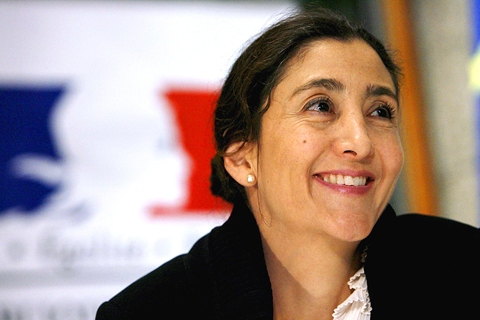Former Colombian presidential candidate Ingrid Betancourt pledged on Saturday to press Latin American leaders to help get the Revolutionary Armed Forces of Colombia (FARC) rebels to disarm, after arriving in Colombia for the first time since she was rescued from guerrillas after a six-year hostage ordeal.
“I am so very happy to be here,” she said shortly after arriving at Bogota’s El Dorado international airport where she and her mother, Yolanda Pulecio, were greeted by French Ambassador Jean-Michel Marlaud.
Betancourt, 46, who holds dual Colombian and French citizenship, flew to France with her family three weeks after her release on July 2. On Saturday she was whisked to a private meeting with Colombian President Alvaro Uribe at the CATAM military airport adjacent to El Dorado.

PHOTO: EPA
She said she would visit Quito, Lima, Santiago, Buenos Aires, Sao Paulo, Brazil, La Paz and Caracas.
Her goal is to ask presidents to join a drive to get the FARC to lay down its arms, a statement obtained by AFP said.
Betancourt’s visit to Colombia five months after her rescue will be brief since she has often stated she fears for her life here after receiving death threats from rebels.
The online edition of Brazil’s O Globo daily said Betancourt would meet with Brazilian President Luis Inacio Lula da Silva in Sao Paulo on Friday.
Betancourt’s visit to Colombia comes 24 hours after tens of thousands marched in France, Spain and across Colombia demanding the release of hostages still being held by the FARC, Latin America’s largest and longest-fighting rebel group.
Betancourt headed a demonstration in Madrid alongside Spanish Foreign Minister Miguel Angel Moratinos.
But her homecoming is fuel for mixed feelings in Colombia.
While tens of thousands marched in some 200 Colombian cities on Friday to demand the release of thousands of hostages held by the FARC and other rebel and criminal groups in the country, the demonstrations were far less massively supported than on July 20, when some 4 million Colombians turned out to voice outrage at the ongoing hostage situation.
The lower turnout on Friday was in part blamed on the ill feelings that many Colombians have toward Betancourt for leaving their country so soon after her rescue.
“We feel deeply for her six years of captivity, but she’s using the [hostage] issue as a political platform,” Oscar Morales, the founder of the One Million Voices Against FARC movement, told Bogota’s El Tiempo newspaper.
Betancourt has said that she does not wish to return to politics in Colombia.

POLITICAL PRISONERS VS DEPORTEES: Venezuela’s prosecutor’s office slammed the call by El Salvador’s leader, accusing him of crimes against humanity Salvadoran President Nayib Bukele on Sunday proposed carrying out a prisoner swap with Venezuela, suggesting he would exchange Venezuelan deportees from the US his government has kept imprisoned for what he called “political prisoners” in Venezuela. In a post on X, directed at Venezuelan President Nicolas Maduro, Bukele listed off a number of family members of high-level opposition figures in Venezuela, journalists and activists detained during the South American government’s electoral crackdown last year. “The only reason they are imprisoned is for having opposed you and your electoral fraud,” he wrote to Maduro. “However, I want to propose a humanitarian agreement that

ECONOMIC WORRIES: The ruling PAP faces voters amid concerns that the city-state faces the possibility of a recession and job losses amid Washington’s tariffs Singapore yesterday finalized contestants for its general election on Saturday next week, with the ruling People’s Action Party (PAP) fielding 32 new candidates in the biggest refresh of the party that has ruled the city-state since independence in 1965. The move follows a pledge by Singaporean Prime Minister Lawrence Wong (黃循財), who took office last year and assumed the PAP leadership, to “bring in new blood, new ideas and new energy” to steer the country of 6 million people. His latest shake-up beats that of predecessors Lee Hsien Loong (李顯龍) and Goh Chok Tong (吳作棟), who replaced 24 and 11 politicians respectively

Young women standing idly around a park in Tokyo’s west suggest that a giant statue of Godzilla is not the only attraction for a record number of foreign tourists. Their faces lit by the cold glow of their phones, the women lining Okubo Park are evidence that sex tourism has developed as a dark flipside to the bustling Kabukicho nightlife district. Increasing numbers of foreign men are flocking to the area after seeing videos on social media. One of the women said that the area near Kabukicho, where Godzilla rumbles and belches smoke atop a cinema, has become a “real

‘WATER WARFARE’: A Pakistani official called India’s suspension of a 65-year-old treaty on the sharing of waters from the Indus River ‘a cowardly, illegal move’ Pakistan yesterday canceled visas for Indian nationals, closed its airspace for all Indian-owned or operated airlines, and suspended all trade with India, including to and from any third country. The retaliatory measures follow India’s decision to suspend visas for Pakistani nationals in the aftermath of a deadly attack by shooters in Kashmir that killed 26 people, mostly tourists. The rare attack on civilians shocked and outraged India and prompted calls for action against their country’s archenemy, Pakistan. New Delhi did not publicly produce evidence connecting the attack to its neighbor, but said it had “cross-border” links to Pakistan. Pakistan denied any connection to